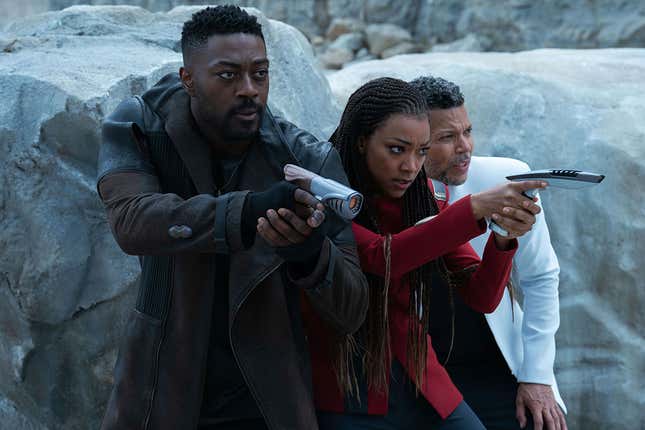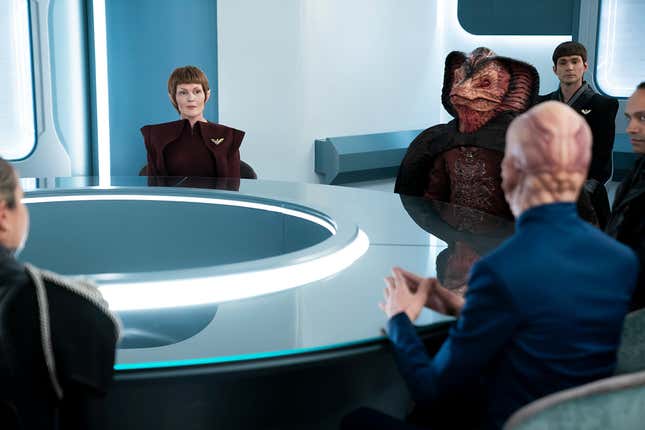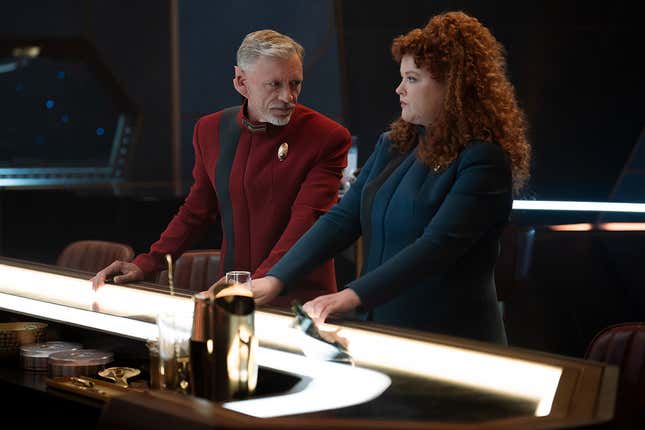Star Trek: Discovery has always been about one thing: at the end of it all, the only thing that matters, the only thing that will bring light in dark times, and save the day, is a connection and understanding forged between people, regardless of who they are or what they’ve done. Sometimes, it’s more subtle about reminding us of this than others. This week was definitely one of the others.

Advertisement
“Jinaal” is quick to get going after last week’s explosive two-episode premiere gave Michael and the crew a TNG-throwback mission to stop the mysterious Moll and L’ok getting their hands on Progenitor tech—and use their leg up on the duo wisely to get on to the Trill homeworld as soon as they can, in the search of the next clue to the Progenitor puzzle. It turns out, they’re actually looking for a person, so much as they are the clue—the titular Jinaal, a host of the Bix symbiont, who worked with the Romulan science team that discovered the technology’s existence eight centuries prior, at the height of the Dominion War.
Advertisement
Bad news: Trill don’t live for 800 years, and Jinaal is very, very dead. Good news: symbionts are much more lasting, and it turns out the Bix symbiont is still around with its host, Kalzara. Better(?) news: after answering a very simple riddle, Kalzara agrees to undergo a Trill ritual known as the Zhian’tara—a process seen in DS9 and Discovery that allows the consciousness of a past joined Trill to be put in another body for a period of time. After Dr. Culber eagerly accepts to be Jinaal’s organic AirBnB, the transfer is done, and Michael and Book are off on Culber-Jinaal’s tail to go find the clue.
Advertisement

If all this sounds like it’s going at an alarming pace, it is and it isn’t. While “Jinaal” certainly gets going very quickly, there is both not much else to the episode and also a big breath and pause, because Discovery gets ready to lay its forever thesis on thick. All of this—all of it, not just the main thrust of the episode but its parallel stories aboard the Discovery with new first officer Commander Rayner, and back at Federation HQ with now-Ambassador Saru—is in service of people facing something, momentarily struggling, and then realizing “oh, this is much more solvable when everyone talks to each other and connects. Hooray!” And like we said, not only does the episode slow itself down to make this point clear, it makes this point plainly and repeatedly for the rest of the episode.
Advertisement
Look, this is not necessarily a bad thing—it’s actually been for the most part very beneficial for Discovery for it to embrace that this idea, an intrinsic aspect of Star Trek’s hope for the future, is the core of its identity. Star Trek’s ideal is people from across different species, backgrounds, gender identities, linguistic barriers, adversarial pasts, even across lines of understanding of radically different forms of sentient life, coming together in the face of evil and standing against it as one. Coalescing itself around that idea has given Discovery both a certainty and a confidence in recent seasons that at its most frustrating points, it deeply lacked. But god, sometimes you just gotta chill on it having every character in every storyline of an episode saying that idea to each other back and forth.

Advertisement
We see it on Trill, when it turns out Jinaal is leading Michael and Book into a nest of invisible, barb-shooting giant creatures—a test to see if, when faced with unintentional aggression, they reply in turn or seek to find a peaceful solution so every party gets what they want (hazard a wild guess which one Michael does, and therefore proves herself worthy of inheriting the next clue to the Progenitor tech). We see it back on Discovery, when the irascible Rayner, ordered by Michael to do one-on-one social introductions with the senior crew, treats everyone so brusquely that even Tilly has to snap at him and tell him to stop being a jerk trying to prove himself and actually get to know the people he’s now working with (Rayner’s “this meeting will last with you saying 20 words about yourself, max” attitude does at least let us give some of Discovery’s awkwardly barely known crewmembers pockets of personality though, that’s nice). And we even see it back at Federation HQ, when Saru’s first day as an ambassador sees him forced to reckon with the political worries of whether or not his engagement to T’Rina will upset her career, after he learns of potential pushback to her husband-to-be from Vulcan purists.
In the end, all of these storylines end the same way: our heroes embrace understanding and seeking connection over aggression and division, and realize their problems are best solved when everyone talks to each other. Michael and Book get the clue (although we learn at the every end of the episode that Trill’s famously tight security of guys in red robes going “I dunno man, I’m just here to ask you a riddle” is in fact not so tight, after Mol sneaks in Guardian disguise to plant some kind of tracking device on Adira), having convinced the creatures and Jinaal alike that their intentions are peaceful. Rayner eventually realizes, after a drink and Tilly’s further prodding, that the only way he’ll get the respect of the Discovery crew that he had with his former one on the Antares will come when he offers himself openly in respect to them. And of course, Saru and T’Rina’s brief disagreement over their protectiveness of each other is quickly resolved when they actually talk to each other and make their feelings clear, instead of making assumptions and debating over it internally.
Advertisement

“Jinaal” then is not a bad episode. It’s breezy, it’s got some fun moments, Wilson Cruz gets to loosen up a little playing host to Jinaal’s consciousness for a while, and while the action here isn’t quite as on the scale of the premiere’s shootouts and chases, it’s still really fun (one of the best things about Discovery’s jump to the 32nd century has been about how it plays with near-instantaneous, localized beaming, and it’s used greatly here). It just happens to be a distinctly unsubtle one in ways the show has only rarely dipped into being in the past. Nothing particularly advances here beyond the team getting the next bit of the Progenitor puzzle and moving on, there’s no real character work beyond little kernels setting things up to come, nor are Discovery’s oft-hammered-home themes particularly challenged here: they are just repeated, very, very clearly, across multiple fronts.
Advertisement
Hopefully now that it’s sure everyone’s paying attention, it can hammer home those themes a little more gracefully as the adventure continues.
Want more io9 news? Check out when to expect the latest Marvel, Star Wars, and Star Trek releases, what’s next for the DC Universe on film and TV, and everything you need to know about the future of Doctor Who.
Services Marketplace – Listings, Bookings & Reviews